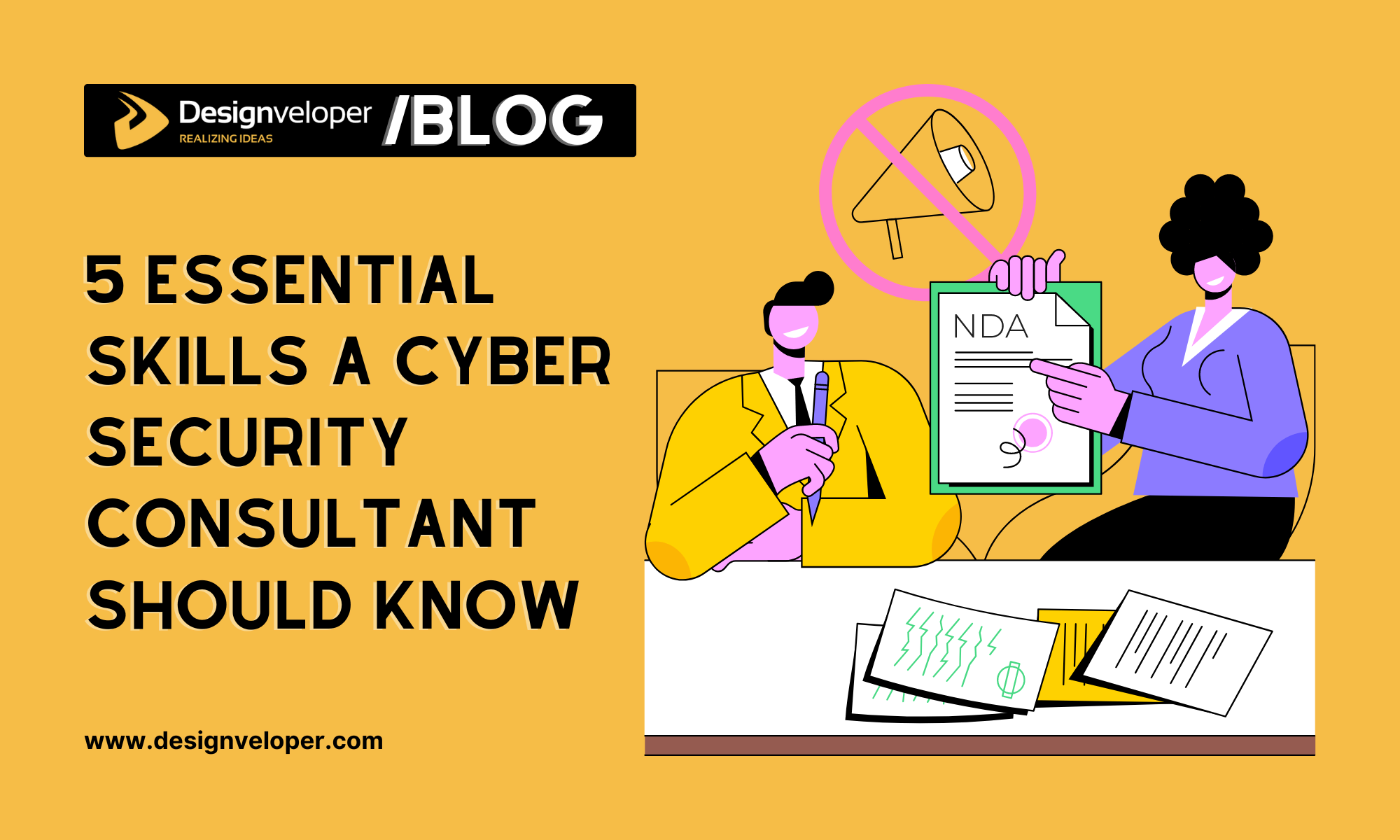5 Essential Skills a Cyber Security Consultant Should Know

In today’s society, or as we may refer to it as the digital world, the position of a cyber security consultant is very important. They are the guardians against a wide array of cyber threats, the knowledge of which forms the basis of defense of our electronic systems. This article from Designveloper will provide an insight into five critical competencies that are valuable to every cyber security consultant supported by facts and research.
More details of these skills will feature in the discussions below as well as corresponding examples for preparation towards the tough process of consulting practice. So, always recall the fact that in the world of cybersecurity, there can be no standing still.
The Role of a Cyber Security Consultant
Now it is time to get to understand the function of a cyber security consultant, a position that has significant value in modern society. These specialized advisors audit an organization’s information technology systems, determine their strengths and weaknesses regarding cyber security, and propose plans to safeguard the systems. They specialize in a broad spectrum of IT systems as well as security measures, which enable them to help companies safeguard their data, infrastructure, and other digital properties from intrusions and cyber threats.
Explanation of what a Cyber Security Consultant does
A cyber security consultant is a knowledgeable and experienced professional who is responsible for protecting an organization’s computer based information. They analyze the threats detect security breaches, analyzes risks and puts measures in place to guard a firm’s computer networks against malicious attacks. It involves considering several factors when rating security systems and designing layers of protection in today’s rapidly evolving context of IT environments.

For example, they perform risk assessments and scans, implement high-level security strategies and models, and create procedural and technological security guidelines and standards. They also do penetration testing and vulnerability assessment to determine areas within a system, which could cause compromises. In addition, they help to address security issues and maybe even hacks, contributing to the creation of response strategies.
With the advancement in technology coupled with computational ability, the regular incidences of cyber crimes like phishing, ransomware, hacking, among others has increased. Overall, there are forecasts that DDoS attacks, with the aim to impede the customers’ access to the servers, will reach 15.4 million by 202, nearly double the rate observed in 2018, 7.9 million.
The various sectors and industries where a cyber security consultant is needed
A cyber security consultant is in demand in the current society in diverse fields of the market and industry:
- Finance: The banking and financial markets sector remains vulnerable to cyber threats because it holds highly confidential information. Cyber security consultants in this sector focus on tackling issues such as hacking, identity theft and fraudulent transactions.
- Government: This information is particularly sensitive due to the nature of work that governments and their agencies undertake. Cyber security consultants assist in defending national security by ensuring that such data does not fall in the wrong hands.
- Healthcare: Pertaining to the aspects of patient record and other related data, the healthcare organizations consider strong cyber security. Specialists in this field strive to adhere to the legal guidelines, such as HIPAA, as well as safeguarding against cyber attacks.
- Manufacturing: Manufacturers are discovering that as they apply IoT and other digital advances, new forms of cyber risk arise. Cyber security consultants assist organizations in matters of confidentiality and integrity of systems and information.
- Technology: Cyber threats are regularly associated with technology companies today. The consultants in this sector aim at addressing concerns to do with protection of information, legal issues concerning patents and recovery of software and hardware goods.
- E-commerce: An online retail store deals with a massive amount of customer information and is vulnerable to cyberattacks. Cyber security consultants assist in safeguarding the data and the payment system from leakage or any other form of attack.
5 Skills a Cyber Security Consultant Needs
Professionally tuned into the dynamics of current society and its advancement towards the digital environment, a cyber security consultant is an essential figure in the process. In a way, they are guards of our information space since their efforts help to determine the protection levels of our digital structures.
Such expertises include technical expertise with the knowledge on matters such as the architecture of the computer networks and the principles of encryption, as well as the strategic expertise where one is supposed to identify the risks with the information assets within the organization and how to eliminate them. For instance, it is mandatory that one should have a good grip over scripting languages such as python or Power Shell for creating tools as well as for automating jobs.
Skill 1: Knowledge of Programming Languages
The first and perhaps the most important skill that one should possess as a cyber security consultant is programming languages. Considering the fact that cybersecurity is concerned with the protection of digital information and resources, it should not come as a shock that cybersecurity practitioners should have a solid understanding of programming languages.
There are some common programming languages when it comes to cybersecurity among the various programming languages available. Some of the most popular programming languages are Python, Java, C++, JavaScript, PowerShell, SQL, Ruby, Go, Bash, and Rust. The ability of each language is unique and has its own strength in different cybersecurity operations.
For example, Python is the most employed programming language in cybersecurity today. That is a popular and strong programming language and each role should be familiar with it. Deeply ingrained into the work of blue teams, Python helps automate processes, analyze extensive data to locate dangers and develop networking, as well as incident handling tools. Its easy syntax and vast collection of libraries make it a great language for such tasks as log analysis or creating the security dashboards.
On the other hand, red teams leverage the capabilities of Python to create extensive specific exploits, draw complex attack scenarios, and perform penetration tests with Python’s extensive networks and security libraries like Scapy and Metasploit available for use. Red team specialists striving to identify deficiencies in the organization’s security measures and analyze its resistance will find Python an invaluable weapon in their arsenal due to its versatility and ease of use.
Skill 2: Understanding of Cyber Laws and Regulations
The second of these important set of skills that the cyber security consultant needs to possess is a good grasp of cyber laws and regulations. Their job entails operating in a tremendously delicate environment that involves compliance with regulatory standards and laws. Security strategies and measures deployed must conform to sectorial-legal requirements and international best practices so as not to incur penalties that may have legal and financial consequences.
For instance, in the United States, numerous laws and regulations govern cybersecurity. Some of them include HIPAA that safeguards the patient health information, and FISMA which is a law that compels the government agencies to formulate ways of protecting their information system from cyber threats. The Gramm-Leach-Bliley Act, or GLBA covers the use and disclosure of financial information while the Payment Card Industry Data Security Standard, or the PCI DSS outlines security requirements for industries that accept, process, store or forward card holder data.
Besides, the industry regulations that relate to a business are quite numerous, and they vary depending on the industry in which the business is located, the geographical location of the business, and the geographical location of customers that it serves. That makes it paramount that the cyber security consultant possesses adequate knowledge of the laws and regulations of sectors they deal with.
Skill 3: Proficiency in Risk Analysis
The third important skill of a cyber security consultant is the skill that concerns risk or risk analysis. This includes recognizing concerns and risks within an association’s IT framework and evaluating the risk of a security happening, and seeing how such things could be detrimental if they were to happen. A cyber security consultant should be able to effectively assess potential security risks and vulnerabilities, and also provide solutions about the same.

Risk analysis is a continuous process that must be molded based on the unique threat an organization faces and the approach to ensure the risk of having a breach or any disruptive event is minimized. For instance, a consultant may want to properly schedule time and resources in response to threats convincingly enough in order to enhance the general protective structure. This includes the identification of risks together with their assessment for decision making and developing a plan for a response to an incident.
Skill 4: Expertise in Network Security
The above brings us to the fourth skill, which is knowledge in network security for the consultant. It entails knowledge in areas of specialization including networks, operating systems, cryptography besides recent tools and measures in combating cybercrime. Additionally, consultants have to be proficient in assessing risks, performing penetration testing mechanisms, and applying security measures.
Network security consultants particularly focus on the proper defense of an organization’s computer networks to prevent a breach, unauthorized entry, and other security threats. A strong foundation begins with reliable infrastructure, and installing fiber optic for your business can significantly enhance network speed and stability, ensuring secure and efficient data transmission. They have a vast knowledge of the network protocol/ architecture and security features like firewall, IDS, and VPN.
For instance, they might need to schedule their specific activities in such a way that they can attend to threats that arise in a way that will not compromise the security of the organization at large. This includes risk assessment and decision making for business opportunities and assessing and planning for incidents.
Skill 5: Incident Response and Recovery Planning
The fifth skill that defines a cyber security consultant is the skill that involves planning of response and or recovery action. The process involves responding proactively and efficiently to the different cyber incidents that may occur in an organization in a way that reduces the impacts on the financial, operational, and reputational aspects of the business organization.
The meaning of cyber threats and its management by organizations is facilitated by an efficient incident response plan. The companies successfully implementing security automation had a 29% improvement in the time to identify and mitigate a breach—amounting to 27 days faster, on average than those with no automation at all.
The incident response process typically involves six phases: prevention, detection, containment, elimination, recovery, and post incident activity known as lessons learned. In response, IT crews perform incident response procedures – the efficacy of the preparedness during this phase determines the run’s success and the injury to the firm.
For example, there should be clarity on several aspects that encapsulate response plan, including who to inform, the mode of communication, and who has the authority to speak to the media on behalf of the organization. Another essential element is to stay in contact with the internal stakeholders and customers and, possibly, the public, to ensure the situation is under control without losing credibility.
They should clearly and succinctly explain how one will approach threats and how threats will be dealt and managed, and steps to be taken in cases where data or systems are lost. This includes directions on how the company can actually isolate its affected systems, remove the malicious content, and get the affected systems back online.
Designveloper’s Cyber Security Consultant Services
At Designveloper, we understand the critical role a cyber security consultant plays in safeguarding an organization’s digital assets. As a leading web and software development company in Vietnam, we offer comprehensive cyber security consultant services to help businesses navigate the complex landscape of cyber threats.
Versatile Cyber Security Consultant Services
Here at Designveloper, we offer detailed cyber security consultant services to help your every need, as well as businesses of all sizes.
Compliance and Regulatory Consulting
We provide “Compliance and Regulatory Consulting” among a range of services that we have in Designveloper for cyber security consultants. Ensuring that legal requirements are met and planning strategies for addressing the regulatory requirements is one of our major functions. This way we make sure that the security we offer as well as the strategies and measures that we put into practice are in compliance with applicable regulations and guidelines of the various industries so as to avoid attracting the law or incurring fines for compliance.
We are proud to have a team of expert consultants who can help organizations to link cybersecurity, business, and compliance risks to the strategic change processes. We assist a company evaluate and/or plan, develop and/or organize, execute and/or install, and sustain a successful cybersecurity and risk management solution which mitigates against threats; manages and controls risk; enforces regulations and compliance; and catalyzes change.
With the shift to a more digital based model for business, there is a vast increase in both the amount and the rate at which information flows through an enterprise and between enterprises, partners and customers. This has posed a shift and created new forms of risk and exposures to cyber threats that previously seemed impossible. Fortunately, we, at Designveloper, are here to assist you in the process of making those changes and catching risk and defense risk as early as possible.
We work to assist clients in both the public and private sectors by providing transformation plans primarily in security domains, effectively implementing as well as managing new or existing programmes that could offer endurance operational enhancement and improving our clients’ strategic cybersecurity investment and aligning them towards business objectives.
Security Architecture
At Designveloper, it is known that security architecture is the well-thought design of the security of systems, policies, and technologies used to safeguard IT and business resources against cyber threats. In our outstanding list of cyber security consultant services, we provide the ultimate “Security Architecture” services.

This is due to our team of experienced consultants who assist organizations in developing, implementing and maintaining their security systems. In this approach, we make sure that the security architecture translates to cybersecurity in relation to the goals, values, and risk appetite of a particular company. This also entails the formulation and revision of the general security plan, allocation of funds for upgrading the security software or hardware, supervising security enhancement projects, and planning for security testing.
For instance, we may appropriately schedule time and other resources as threats surface to enhance security. This involves identifying and assessing risks for managerial decision making and developing a plan for a particular event occurrence.
Secure Software Development
Being an acclaimed web and software development company in Vietnam, we are aware of the significance of Security awareness across the entire SDLC.
Our team of cyber security consultants understands that security is not an amity, as they consult with developers in the development phase. This entails performing dynamic analysis and security scanning, code reviews, or even actively engaging in intensive penetration testing.
For instance, our consultants utilize a process called static analysis which helps in detecting defects and vulnerabilities in source code. This process detects common vulnerable codes in a software program to help the development teams correct problems before revealing to an end user.
Furthermore, we realize that security is not an afterthought in applying throughout the SDLC, and it has to be on the forefront of any developer working on your software’s development. Through proper determinism and implementation of security solutions, the security challenges can effectively be dealt with at the SDLC pipeline before the software is deployed to the production environment.

















































